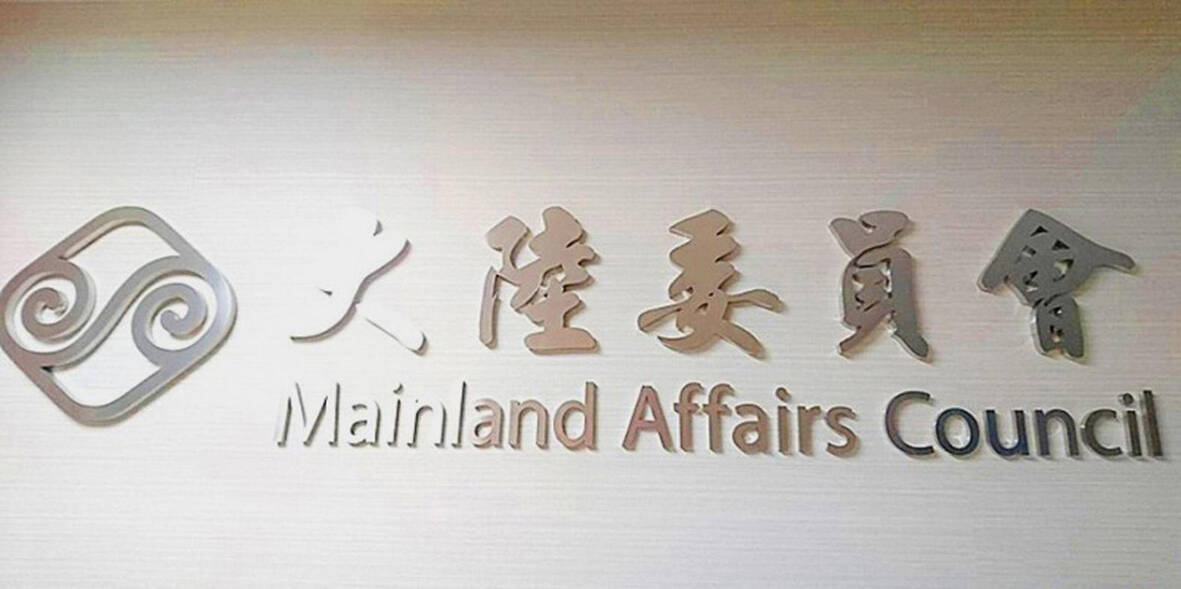The Mainland Affairs Council (MAC) is considering a legal amendment to tighten permanent residency requirements for Hong Kongers.
The changes would extend the minimum period Hong Kongers must stay in Taiwan to become eligible to apply for permanent residency, from one year to at least four years.
The council is considering amending the Regulations Governing Permits for Hong Kong and Macau Residents Entering the Taiwan Area and Setting Up Residence or Registered Permanent Residence in the Republic of China (香港澳門居民進入台灣地區及居留定居許可辦法), a government official said yesterday, speaking on condition of anonymity.

Photo: Chung Li-hua, Taipei Times
Current regulations stipulate that Hong Kong and Macau residents who have lineal relatives or a spouse with a household registration in Taiwan, have received “overseas compatriot education” or contributed to overseas community affairs before the UK or Portugal ended their governance of the territories, invested more than NT$6 million (US$195,185) in Taiwan, or have passed review by a central competent authority can apply for permanent residency after staying in Taiwan “for a period of time.”
The official said the term “for a period of time” means they can apply for naturalization after staying in Taiwan for one year, which is a “quasi-national treatment,” as other foreign nationals must stay for five years before they can apply for naturalization.
Asked why Hong Kong and Macau residents are given special treatment, the official said the government sympathized with Hong Kongers after the territory was returned to China in 1997.
Hong Kong residents who held a Taiwanese identity card before 1997 were considered Taiwanese citizens, so under the special circumstances, the government at the time granted Hong Kongers “quasi-national treatment,” allowing them to be naturalized after staying in Taiwan for one year, the official said.
Hong Kong and Taiwan had a special relationship, but after Beijing implemented the National Security Law in Hong Kong in 2020, breaking its promise of “one country, two systems,” the territory has not been the same, they said.
Democracy, freedom and human rights no longer exist in Hong Kong, democracy advocates have been jailed, district councilors who support Taiwan or democracy have been disqualified and many people from mainland China have migrated to Hong Kong, the official said.
National security agencies are concerned that China might try to infiltrate Taiwan through Hong Kong, they said.
According to the proposed amendment, Hong Kongers born in Hong Kong and with no relatives in mainland China would need to stay in Taiwan for four years before they can apply for permanent residency, the official said.
Mainland Chinese with permanent residency in Hong Kong would need to stay for at least six years before they can apply, similar to Chinese spouses of Taiwanese, they said.

The CIA has a message for Chinese government officials worried about their place in Chinese President Xi Jinping’s (習近平) government: Come work with us. The agency released two Mandarin-language videos on social media on Thursday inviting disgruntled officials to contact the CIA. The recruitment videos posted on YouTube and X racked up more than 5 million views combined in their first day. The outreach comes as CIA Director John Ratcliffe has vowed to boost the agency’s use of intelligence from human sources and its focus on China, which has recently targeted US officials with its own espionage operations. The videos are “aimed at

STEADFAST FRIEND: The bills encourage increased Taiwan-US engagement and address China’s distortion of UN Resolution 2758 to isolate Taiwan internationally The Presidential Office yesterday thanked the US House of Representatives for unanimously passing two Taiwan-related bills highlighting its solid support for Taiwan’s democracy and global participation, and for deepening bilateral relations. One of the bills, the Taiwan Assurance Implementation Act, requires the US Department of State to periodically review its guidelines for engagement with Taiwan, and report to the US Congress on the guidelines and plans to lift self-imposed limitations on US-Taiwan engagement. The other bill is the Taiwan International Solidarity Act, which clarifies that UN Resolution 2758 does not address the issue of the representation of Taiwan or its people in

US Indo-Pacific Commander Admiral Samuel Paparo on Friday expressed concern over the rate at which China is diversifying its military exercises, the Financial Times (FT) reported on Saturday. “The rates of change on the depth and breadth of their exercises is the one non-linear effect that I’ve seen in the last year that wakes me up at night or keeps me up at night,” Paparo was quoted by FT as saying while attending the annual Sedona Forum at the McCain Institute in Arizona. Paparo also expressed concern over the speed with which China was expanding its military. While the US

SHIFT: Taiwan’s better-than-expected first-quarter GDP and signs of weakness in the US have driven global capital back to emerging markets, the central bank head said The central bank yesterday blamed market speculation for the steep rise in the local currency, and urged exporters and financial institutions to stay calm and stop panic sell-offs to avoid hurting their own profitability. The nation’s top monetary policymaker said that it would step in, if necessary, to maintain order and stability in the foreign exchange market. The remarks came as the NT dollar yesterday closed up NT$0.919 to NT$30.145 against the US dollar in Taipei trading, after rising as high as NT$29.59 in intraday trading. The local currency has surged 5.85 percent against the greenback over the past two sessions, central